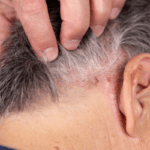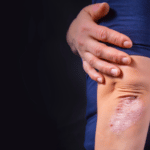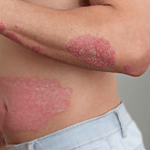Psoriasis is a chronic autoimmune skin disease, which causes red, scaly rashes on the elbows, knees, hands, lower back, and scalp. It is vital to reduce the triggers and flare-ups to manage this skin condition.
While several factors can worsen psoriasis symptoms, the wrong diet is one of the most common ones. Diet modifications can help relieve symptoms of the condition.
In this article, you will discover what foods to eat and avoid to better treat psoriasis.
Read: How to Cure Psoriasis Permanently
Foods to Avoid if You Have Psoriasis

1. Fatty Red Meat
Red meat has a polyunsaturated fatty acid called arachidonic acid, which may create psoriatic lesions. Some studies suggest it may trigger inflammation and lead to bigger and more severe psoriasis flares.
Even if it does not worsen psoriasis, it can promote heart disease. Note that people with psoriasis have a higher risk of heart and cardiovascular diseases.
On occasions when you want to eat beef, opt for ground beef with the lowest percentage of fat. Be sure to choose lean cuts, such as sirloin and top and bottom rounds.
2. Sugar
According to various research, people see improvement in their skin inflammation when they cut out junk foods, such as candy, pastries, chocolate, and sweets. Also, these junks have carbohydrates with a high glycemic index. The higher the glycemic index, the more is the risk of triggering psoriasis.
Moreover, sugar raises your chances of heart disease and weight gain. Note that being overweight or obese may make your psoriasis worse.
Various foods, such as bread and pasta sauce, have sweeteners. So check the product label before buying them.
3. Gluten
While there are few direct supporting studies of gluten affecting psoriasis, its cut down is stated because of celiac disease. Celiac disease — like psoriasis—is an autoimmune response that causes the body to attack tissues in the small intestine. So it makes sense to make the derivation that psoriasis may also have gluten sensitivity.
Avoid wheat, rye, barley, malt, and other gluten-containing foods from your diet as a gluten-free diet can help dodge a run-in with your psoriasis.
4. High-Fat Dairy
High-fat dairy products can lead to inflammation. Let’s see how.
If you consume cow’s milk or products made from it, you may have trouble digesting it as it contains casein. Additionally, people with lactose intolerance don’t have enough of the digestive enzyme lactase. Hence, dairy consumption can cause chronic gastrointestinal irritation, which can make inflammation worse.
Hence, try cutting dairy products, especially high-fat ones. Most people have improved psoriasis symptoms after reducing its consumption.
5. Fried Foods
Deep-fried foods in oil or butter are high in saturated fats. These fats have inflammatory compounds called advanced glycation end products (AGEs), which form when you cook food at high temperatures. They can worsen your psoriasis inflammation and also impact the symptoms of other skin inflammations if you have any.
People who cut on high-AGE foods appear to have less inflammation in their bodies after 3-4 months. Instead of fried food, go for baked, boiled, or steamed foods — they are as delicious, if not more.
Foods to Eat if You Have Psoriasis

1. Fruits and Vegetables
Almost every anti-inflammatory diet includes fruits and vegetables for a reason. They are high in antioxidants, which protect your cells against oxidative stress and inflammation.
When it comes to fruits specifically, they are also high in fibers and other vitamins that help fight inflammation. In vegetables, eat more leafy greens. They are low in calories and high in fiber, so they’re diet-friendly.
Here are a few fruits and vegetable recommendations that you should include in your diet –
- Broccoli, cauliflower, and Brussels sprouts — saute them in healthy vegetable oil.
- Leafy greens, such as kale, spinach, and arugula — toss in salads or soup.
- Berries, including blueberries, strawberries, and raspberries — a berry smoothie as a morning or evening snack.
- Cherries, grapes, and other dark fruits — make a bowl of mixed fruits salad.
2. Fatty Fish
Fatty fish has omega-3 that can help you with inflammation and give your immune system a boost. While there is little research on the subject, a study states that people who ate 6 ounces of fatty fish a week saw their psoriasis symptoms get better.
The American Heart Association recommends eating fatty fish, such as albacore tuna, mackerel, salmon, herring, and lake trout, at least two times a week to protect against heart diseases. As we have pointed out before, people with psoriasis have a higher risk of heart and cardiovascular diseases.
3. Spices and Herbs
Spices and herbs are anti-inflammatory antioxidants. Herbs also help with enhancing the body’s immune system. While there is little to no scientific evidence that supports the use of herbs and spices, studies are in progress.
Another reason to flavor your dishes with spices and herbs is that you tend to use less salt, which helps keep your blood pressure in check.
Primrose oil, milk thistle, and oregano oil are known to report success for the patients. There are also conversations around turmeric and its therapeutic ability to treat psoriasis due to a variety of mechanisms, including reducing oxidative stress. You can also use cinnamon, nutmeg, rosemary, cumin, or basil.
4. Olive Oil
Cooking oils have a bad reputation. However, not every one of them is created the same way. Olive oil contains omega-3 fats, which, as stated above, have anti-inflammatory properties.
You can toss your favorite veggies in olive oil and ensure their limited amount of use in your daily diet. Or use them to cook fish, beans, and whole grains. Or prepare salad dressings with fruits, nuts, and greens of your choice. If you want to change the taste occasionally, use nut and avocado oils.
5. Whole Grains
Whole grains are rich in fiber, which can help ease skin inflammation. Moreover, they also help you lose weight, and as we stated above, losing some pounds can improve your psoriasis symptoms.
You can eat whole-grain bread, cereals, pasta, bulgur, quinoa, barley, and brown or wild rice. Several products have a multigrain label on them, which can be misleading. Ensure that whole grain is the first ingredient listed on the product.
Dietary changes can make a huge difference to your psoriasis symptoms by reducing the frequency and severity of your flare-ups. To control your condition strictly, talk to a dietitian or nutritionist.




